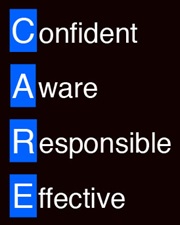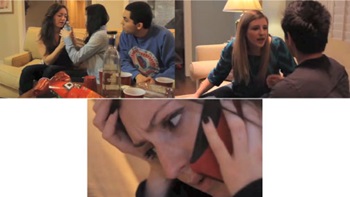TakeCARE
What is TakeCARE?
TakeCARE is a bystander intervention program to help prevent sexual violence on college campuses. It is accessed online, presented as a video. TakeCARE encourages college students to look out for one another in situations that present risk for sexual assault, and to support friends who have been victimized — it encourages students to be more than just bystanders.

Why an online bystander intervention?
Our research team has worked carefully and systematically in developing and refining TakeCARE. Numerous focus groups with diverse groups of college students, staff, administrators, and stakeholders helped inform the development of the program. Since an online program can reach large groups of students quite readily, TakeCARE offers the potential for inexpensive and easy delivery across an entire campus community. The program is approximately 25 minutes in duration.
What does TakeCARE stand for?

As the image to the right suggests, the phrase “TakeCARE” provides a cognitive shortcut for remembering how to intervene successfully in risky situations. In TakeCARE, bystander intervention is described as simply “friends taking care of friends” and the program provides easy to remember principles, reasons, and methods for effective bystander behavior.
Video vignettes
TakeCARE uses video vignettes as a teaching tool to illustrate situations that commonly entail risk for victimization, what those risks are, and how students can help protect and support their friends in such situations.

The narrator’s discussion of the situations helps students understand why the situations are risky and what the possible consequences are for not stepping in to help their friends. After each vignette, the narrator provides numerous ways to be an active bystander and reminds students that, although the situations can be tricky and that it can be hard to know what to do, there’s always something that can be done or said to help.
What else does TakeCARE cover?
TakeCARE also presents information about sexual pressure and coercion, defines and discusses the term “consent” as it applies to sexual behavior, provides examples of the types of behaviors that can exist in unhealthy or abusive relationships, and introduces the idea that both men and women can experience unwanted sexual pressure and relationship violence.
Friends taking care of friends

By focusing on “friends taking care of friends,” TakeCARE is designed to heighten students’ awareness of risk and their willingness to step in and help prevent their friends from being harmed. In addition, by offering an array of possible responses to each situation, TakeCARE attempts to help students expand their repertoire of ways to help, and to reduce reluctance students might feel about helping in difficult social circumstances.
Learn more
To receive more information about the TakeCARE program or to learn about how you can implement TakeCARE at your university, please contact Drs. Ernest Jouriles and Renee McDonald at Southern Methodist University.